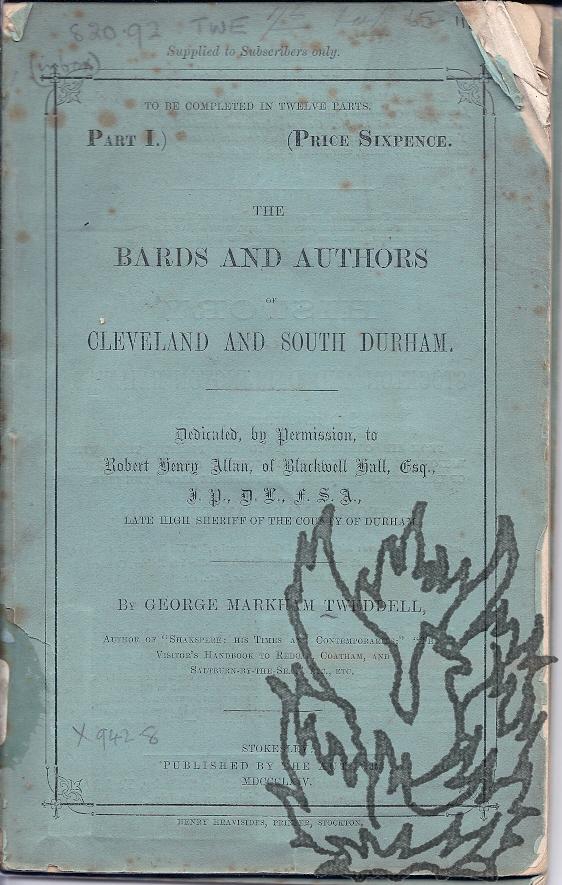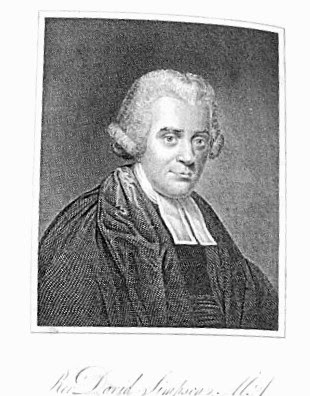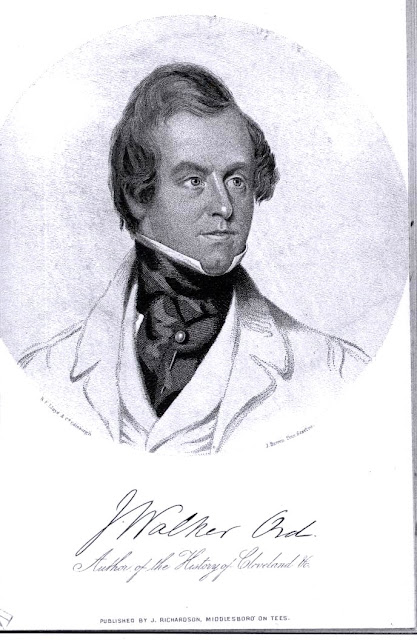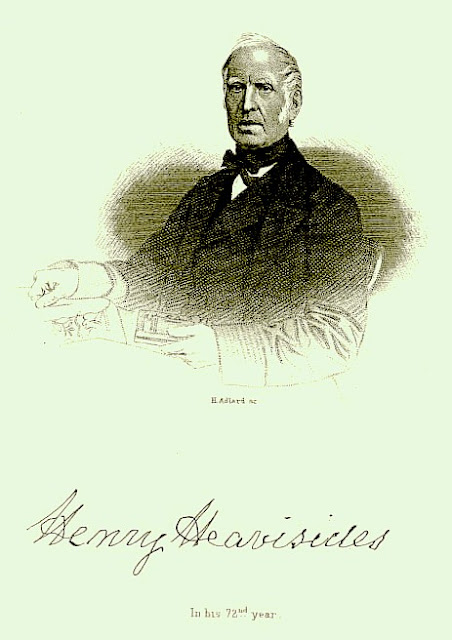
“We may fairly claim that English literature began hereabouts” WH Burnett 1886 Middlesbrough
Below is one of George Markham Tweddell’s many talks. This one is to the Stokesley Mechanics Institute Sat 9th November 1850 on the topic of Local Writers. But first an introduction….
The Bards and Authors of Cleveland and South Durham 1872
In 1872, George Markham Tweddell published The Bards and Authors of Cleveland and South Durham (which can be downloaded free Here ). It was published at first in instalments before being republished as a full book. It contain an essay and often a woodcut of 37 authors, writers and poets who lived in the area from Whitby, up to Stockton on Tees from as early as 500AD to the 19th century. In the introduction, Tweddell mentions another 103 plus writers which he says “such a monomaniac am I that I meditate preparing a second (mayhap, who knows? a Third) series of Bards and Authors! ‘ The second and third volume never appeared. Any notes or work towards the further volumes would have been lost in the Stokesley flood of the 1930’s along with some of his other notes.
There is more on his book on this site here
https://www.artsrainbow.com/georgemarkhamtweddell/2012/12/24/bards-and-authors-of-cleveland-and-south-durham-1872-pdf-george-markham-tweddell/
WHITBY AUTHORS AND THEIR PUBLICATIONS 1867
Other Books on Early North Yorkshire Bards and Authors
In 1867 Gideon Smales published his book
Whitby Authors and Their Publications: With the Titles of All the Books Printed in Whitby, 670 to 1867 (1867) which covered some of the Whitby authors that Tweddell covered later in 1872.
OLD CLEVELAND – LOCAL WRITERS AND LOCAL WORTHIES 1886
 Old Cleveland – Local Writers and Local Worthies 1886
Old Cleveland – Local Writers and Local Worthies 1886
……………………………….
George Markham Tweddell’s Speech to the Stokesley Mechanics Institute First Meeting Saturday 9th November 1850 – Local Writers.
George Markham Tweddell said – “Mr Chairman, Ladies and Gentlemen, it is rather a formidable undertaking for a poor man like myself, who never, during the whole course of his education, possessed the common auxiliaries of learning – a spelling book and an arithmetic – it is a formidable undertaking for such a one to stand forward, on an occasion like the present, to address so goodly an assemblage of the beauty, the learning, and the talent of his native town. It is at times like this, one is apt to feel a certain weakness at the knee-joints, a palpitation of the heart not arising from disease ; and some how or other the teeth are inclined to dance and chatter in the head. But as the tea has been good, and the music excellent (I always feel good tea to be indeed to be what the poet Cowper terms it, “The cup that cheers but not inebriates.” and all know the inspiring effect of heaven-born Music.) and as I see the bright eyes of the ladies smiling encouragingly upon me, (and I never could resist the potent magic of a woman’s smile,) I take courage and address myself as well as I can, to my task.
The sentiment to which I’m required to speak this evening is that of Local Writers, by which expression, I understand, all men of letters who, by birth or residence, have been connected with this district. Since the programme for this meeting was issued to the public, I have been frequently asked the question “Who are the Local Writers?” and I have promised, during the short space allowed me this evening, according to my ability, to answer the inquiry. It was, indeed, my intention to have consulted a few biographical works and local histories, and to have made out as complete a list as I could of Local Writers, whose productions, nay, whose very names – I am sorry to say, are so little known in this, their own district. Cleveland has never yet done justice to such of her sons as have distinguished themselves in the Republic of Letters ; nay, judging from various circumstances, I unhesitatingly declare, that the majority of you, however intelligent you may otherwise be, are totally ignorant of what literary men have been connected with Cleveland and what have not. I have pencilled down, from memory, a few of the authors connected with this district, giving them, as well as recollection will serve me, in chronological order ; and as it is totally impossible to do justice to any one of our Local Writers in the fifteen minutes allowed me to address you, I must content myself with merely, mentioning the names of such of them as I have been able to remember, trusting that some of you will bear them in mind when you have retired to your own domestic hearths, and that you may endeavour to make yourself acquainted with their writings. – The eastern extremity of this district, Sir, produced one of the most celebrated Anglo Saxon poets in person of a poor herdsman, named Cedmon, who afterwards became one of the monks of Whitby. Near twelve hundred years have swept over the earth since his body mouldered into the dust ; but his writings have survived the dark and troubled centuries, and were printed, only nineteen years ago in London. There is much in the personal history of Cedmon, when stripped of the superstitious legends with which tradition has invested it, to remind us of the Scottish plough boy, Robert Burns. His writings, however, bear much greater resemblance to those of John Milton ; so much so, indeed, that I should unhesitatingly declare him the Milton on the Anglo Saxon period era. One will find specimens of his poems in Sharon Turner’s History of the Anglo Saxons, in Dr Young’s History of Whitby, and in that popular and excellent work, Chambers’s Cyclopeadia of English Literature. The next author to whom I shall refer is an English Historian of the fourteenth century – Walter De Hemingford, who was Canon of Guisbo’ Priory. The original manuscript of his history, I believe, is preserved in the Advocates Library in Edingburgh. This history was published at Oxford, by that laborious antiquary, Thomas Hearne. The next literary name that I remember being in anyway connected with Cleveland is that of Sir Thomas Chaloner, the elder, an eminent poet, statesman and warrior of the Elizabethan period. He is the first of the names connected with Cleveland, and was author of several prose works as well as poems. It was his son Sir Thomas Chaloner the younger, who first began manufacture of alum in England, and published a volume On the Nature of Nitre. Two miles from where we are now assembled, was born one of the most eminent divines of the Church of England, one of the most accomplished scholars of his day, Bishop Brian Walton, whose Polyglot Bible, edited, as it was, in the troubled times of Charles the First and the English Commonwealth, will immortalise his name. Another distinguished divine of the Church of England and a celebrated controversialist, a native of this part was Rev. Henry Foulis, son of Sir David Foulis, of Ingleby Manor. His works, though principally controversial, are not forgotten. Passing now to the western extremity of Cleveland, I find the industrious Thomas Rymer, author of The Faedera in fifteen folio volumes and a View of the Tragedies of the late Age was born at Appleton Wiske. His collection of state papers have been termed “an undigested mass“. I wish the writer, instead of applying the epithet, had digested them for us. Fifty eight manuscript volumes of valuable historical documents collected by Rymer, are at present preserved in the British Museum, for Rymer did not eat of the bread of idleness. If I may be allowed to go a stone’s throw from Cleveland Mr Chairman, in the adjoining parish of Kirby Wiske, we shall come to the birthplace of the tutor of Queen Elizabeth, the learned Roger Ascham, author of The Schoolmaster and other works. The next Cleveland writer to whom I shall refer is one whose name I mention with mingled feelings of pleasure and pain allude to John Hall Stevenson of Skelton Castle, the friend and ‘Eugenius‘ of Lawrence Sterne. I feel proud of this gentleman’s learning, proud of his wit and humour but sorry that his talents were so prostituted. While his Fables for Grown Gentlemen his Crazy Tales and other display the fire of true genius, I deeply regret that the greater part of them are not fit for republication in the present day. Pity it is that true genius should ever be prostituted. Passing again a mere stone’s throw from Cleveland – only crossing the river Tees at Stockton was born one of the most eminent of literary antiquarians – Joseph Ritson, and also a poor rope maker and dramatist. Joseph Reed, a scene from whose farce of The Register Office will be familiar to most of you, under the name of Margery Moorpout. The Reverend W. Wray has alluded to one who may be classed amongst Local Writers, seeing that he prepared the manuscript copy of his second voyage round the world for the press ; and all humanity must regret that his untimely murder prevented him from preparing an account of his third. I refer to that truly great and heroic man, Captain James Cook, who was a son of farm labourer of Marton, and received his education at our neighbouring village of Great Ayton, from whence he went to sea, and became the greatest navigator of his time, gaining for himself immortal renown. The Rev. David Simpson, whose Plea for Religion and Key to Prophecies are so well known, was also a Cleveland man. The only writer that Stokesley has produced in by gone days, that I remember ins Thomas Pierson, the author of Rosebery Topping, a poem, and of some play performed here, a copy of which I have never been able to obtain. And how did Stokesley honour or reward her child of the muse? Why she starved him out! Though the poor poet tried so hard to gain for himself an honest livelihood by following the useful callings of Locksmith, Clock and Watch maker and school master, she churlishly denied him bread, entrusted the tuition of her children to an astrologer and forced to be a poor man of letters to seek shelter in “a small place” in the custom house of Stockton. I must not forget the first historian of Cleveland, the late Rev John Graves of Yarm, whose antiquarian researches were equally creditable to himself and useful to others. But all other parts of our district are insignificant as the birthplaces of men of genius, compared to Gisbro’, – bear witness to William Mason, to William Danby, and that unfortunate bard and historian, John Walker Ord, whose writings alone would require a lecture to do them that justice they deserve. Poor Mason, nearly all his writers seem to have perished with him ; the only specimens of his poems that are preserved are Monody on La Place printed in Blackwell’s Magazine and the pieces given in my own Yorkshire Miscellany. Some of the best of the South Durham poets, Mr Chairman, have been singularly connected Stokesley : Thos Watson, author of The Ruin, my friend Henry Heavisides whose Pleasures of Home deserves to be in the home and heart of every Englishman, and the lamented Edward Marsh Heavisides whose poetical and prose remains I now hold in my hand, These have all spent some years of their lives in Stokesley, though none of the three were natives of the place. The Night by Mr Thomas John Cleaver like the Wildflowers of Miss Ayre was published in Stokesley. One noble name Cleveland possesses in the ranks of her literary men, in the person of Marquess of Normanby, ( The Hon Commodore Constantine John Phipps) and the friend of Charles Dickens, (to his honour be it spoken) and author of the novels Matilda, Yes and No, The Contrast as well as Tales of Arinda (?). and The Prophet of St. Paul’s. I turn now to a humble name, but one which I would not willing omit of a poor stone mason of Danby, John Castillo, author of Auld Izaak and Other Poems, principally in the North Yorkshire dialect. Though not born in Cleveland, the Rev. James Holme, vicar of Kirkleatham, deserves honourable mention as the author of Leisure Musings and Mount Grace Priory and other poetical works. Another clergyman I must not forget to mention, as his name is both connected with Stokesley and the literary world, i speak of our late Rector, the Venerable Levison Vernon Harcourt whose Doctrine of the Deluge I trust will find a place in the library of our Mechanics Institute. Have any of that gentleman’s correspondents, our worthy Rector for instance was to give the hint, I doubt not that he would be willingly present with a copy. And now Sir having mentioned one Archdeacon of Cleveland, I ought to mention his successor, the Venerable Henry John Todd, whose Life of Cranmer, revived edition of Johnson’s Dictionary and other works, have made his name well known in the world of letters. As time allowed me now expired, I shall merely mention two more literary names connected with Stokesley, the Rev Charles Cator and a medical writer Mr Lawson Crummey, whose valuable work on the Diseases of the Skin is of practical importance. Mr Chairman, I think I have now fairly and fully answered the question ‘Who are our local Writers’.”
most celebrated Anglo-Saxon poets, in the person of a poor herdsman, named
…………………..
Editor’s note – it is interesting in that Tweddell included in 1850, some of the poets or authors that never made the first and only volume of Bards and Authors of Cleveland in 1872 but were earmarked for the proposed second and third volumes which never appeared. It means we have at least got some of his thoughts and information on them.
Although very much a work in progress at present, a full list and information of the Bards and Authors of Cleveland for various sources including GMT (for possible further research) will be on this site Bards and Authors of North Yorkshire http://bardsandauthors.blogspot.co.uk/
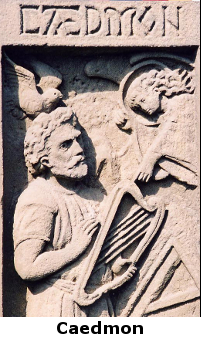 |
| http://www.wilfrid.com/saints/hilda.htm |
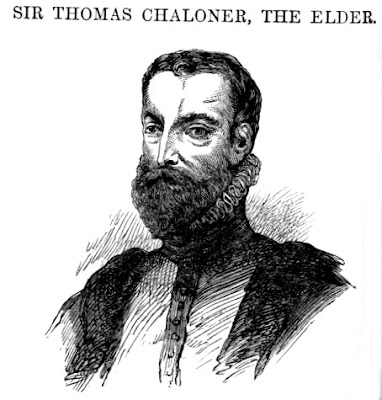 |
| Sir Thomas Chaloner the Elder – woodcut from Tweddell’s Bards and Authors of Cleveland and South Durham |
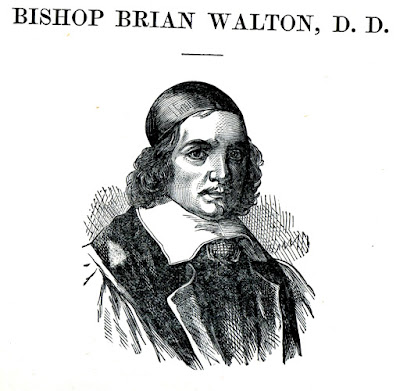 |
| Bishop Brian Walton woodcut from Tweddell’s Bards and Authors of Cleveland and South Durham |
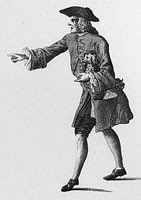 |
| Thomas Rymer http://www.phrases.org.uk/meanings/poetic-justice.html |
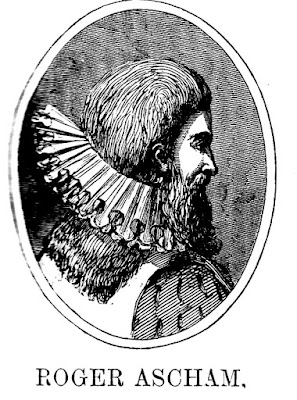 |
| Roger Ascham woodcut from Tweddell’s Bards and Authors of Cleveland and South Durham |
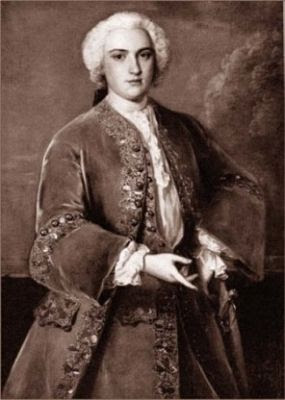 |
| John Hall Stevenson of Skelton Castle. 1718 – 1785. Painted in 1740 by Philipe Mercier. Photo above and below from and more information here http://homepage.ntlworld.com/bandl.danby/Skelton1713_1736.html |
 |
| Laurence Sterne. 1713 to 1768. ……………. Captain James Cook
Thomas Pierson
|
